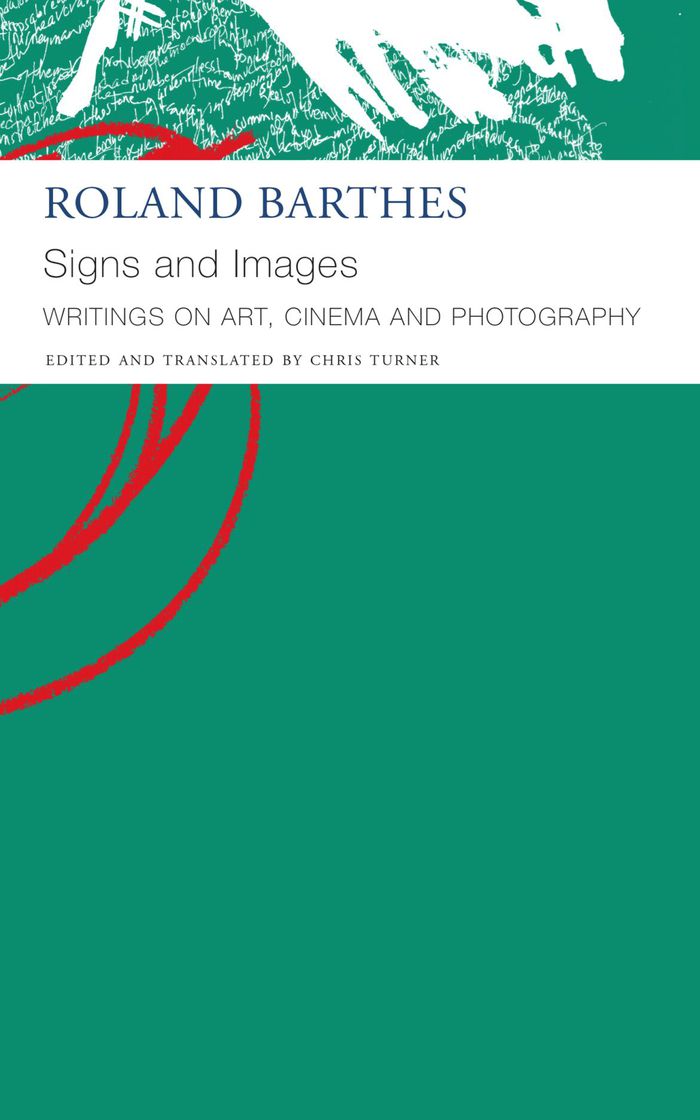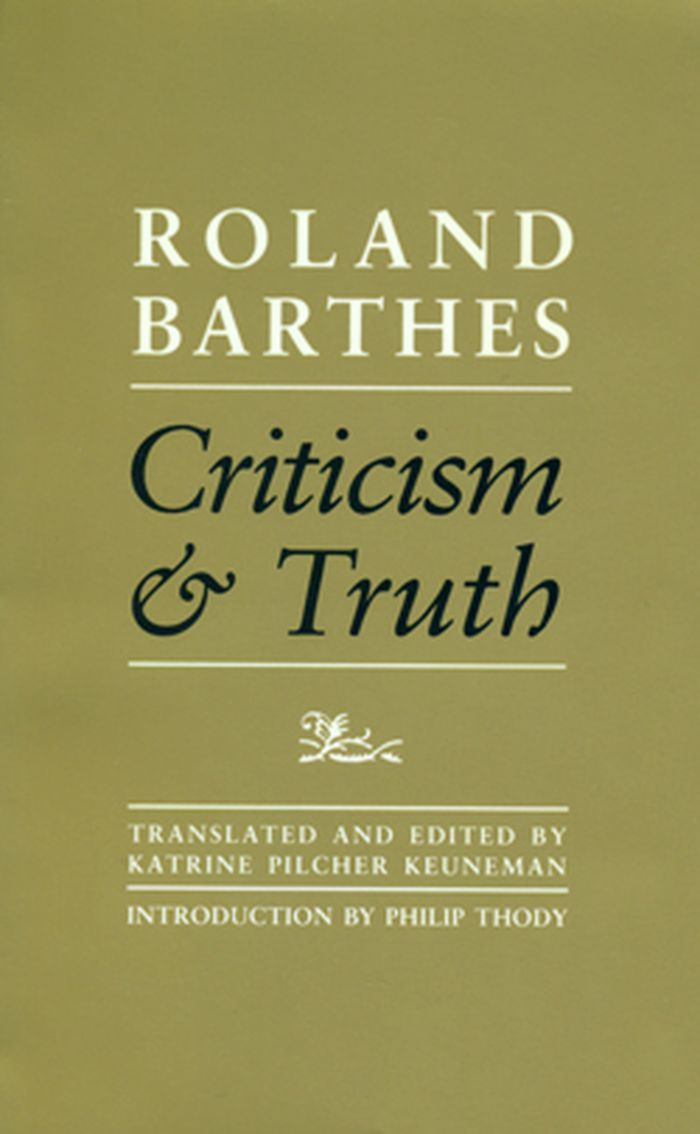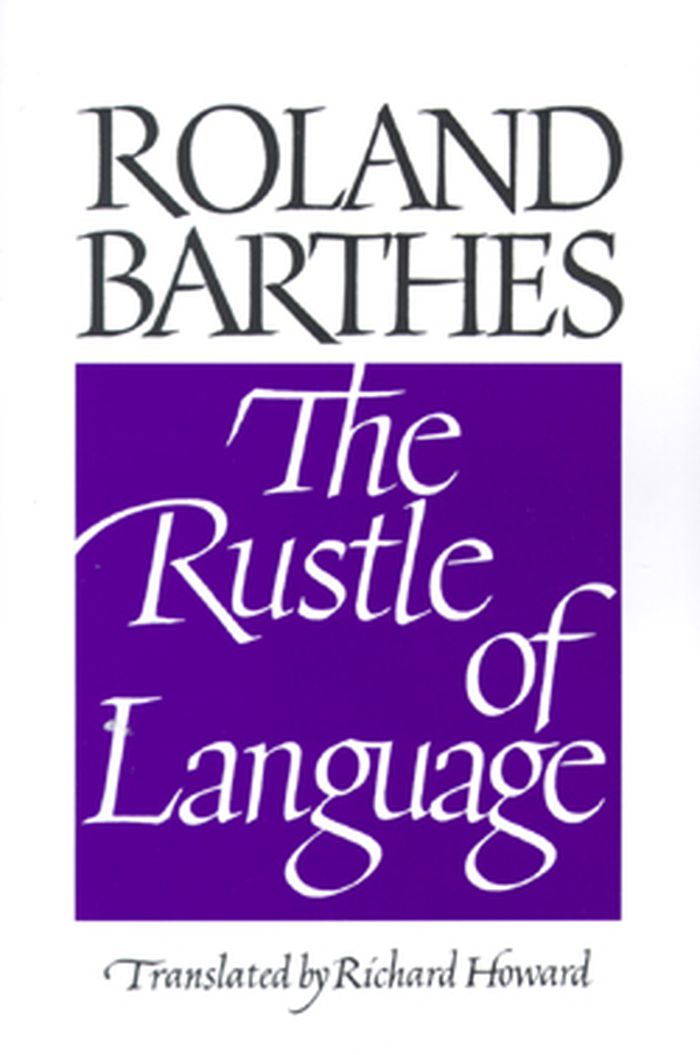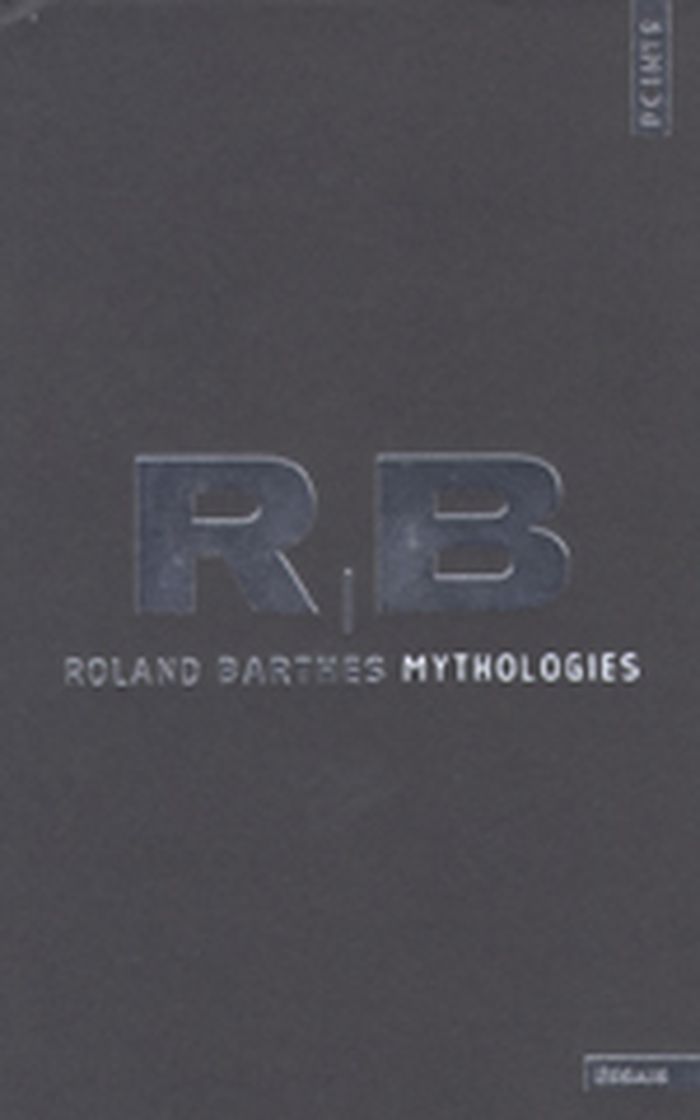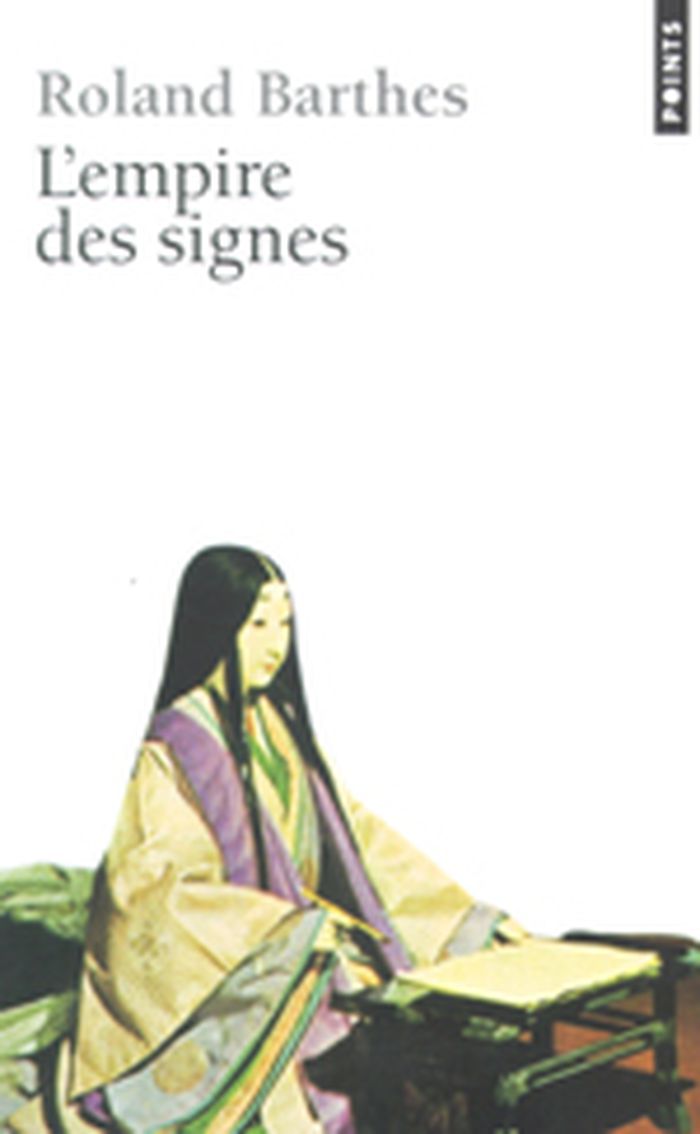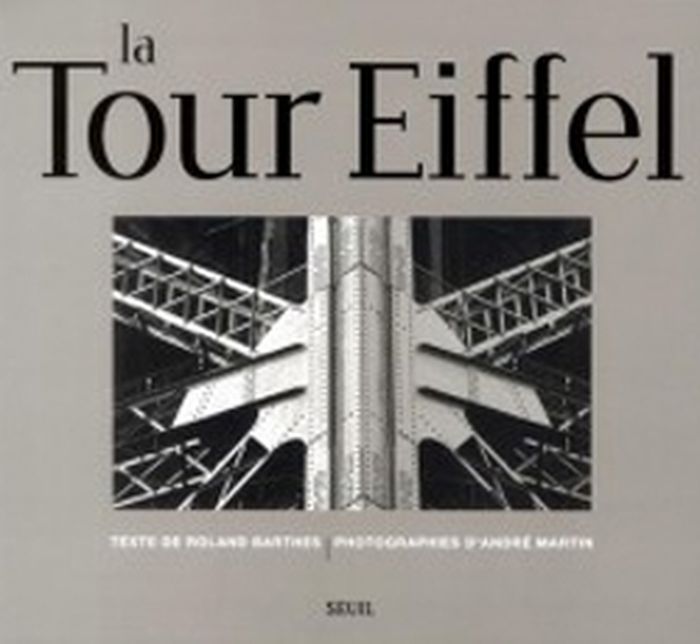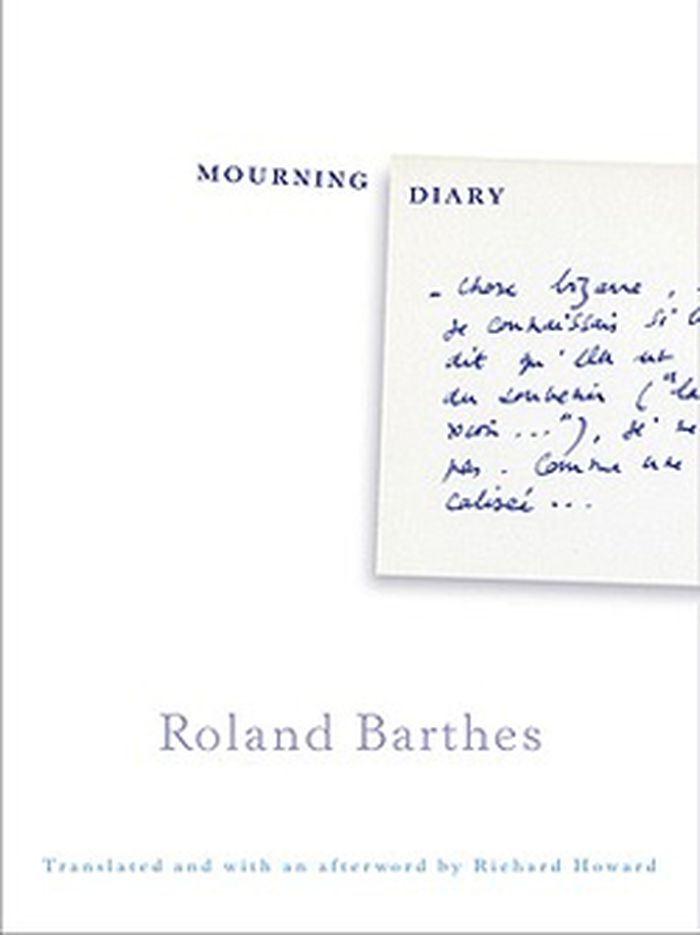$30.00
(available to order)
Summary:
The greater part of Barthes’s published writings has been available to a French audience since 2002, but now, translator Chris Turner presents a collection of essays, interviews, prefaces, book reviews, and other journalistic material for the first time in English and divided into five themed volumes. Volume four, Signs and Images, gathers pieces related to his central(...)
Signs and images: Writings on art, cinema, and photography
Actions:
Price:
$30.00
(available to order)
Summary:
The greater part of Barthes’s published writings has been available to a French audience since 2002, but now, translator Chris Turner presents a collection of essays, interviews, prefaces, book reviews, and other journalistic material for the first time in English and divided into five themed volumes. Volume four, Signs and Images, gathers pieces related to his central concerns—semiotics, visual culture, art, cinema, and photography—and features essays on Marthe Arnould, Lucien Clergue, Daniel Boudinet, Richard Avedon, Bernard Faucon, and many more.
Art Theory
Criticism and truth
$23.95
(available to order)
Summary:
Written in 1966 in response to an attack on Barthes's sur Racine, this polemic answers many of the charges brought against French new criticism by conservative, academic, 19th-century-oriented critics: lack of "objectivity," fondness for "jargon," indifference to the author's intention, etc. More positively, Barthes outlines some key concerns: plurality of meanings;(...)
Criticism and truth
Actions:
Price:
$23.95
(available to order)
Summary:
Written in 1966 in response to an attack on Barthes's sur Racine, this polemic answers many of the charges brought against French new criticism by conservative, academic, 19th-century-oriented critics: lack of "objectivity," fondness for "jargon," indifference to the author's intention, etc. More positively, Barthes outlines some key concerns: plurality of meanings; analysis, based on linguistics, of the structures of possible meanings; the idea of a science of literature; and the dynamics of reading. Though some of the issues are specific to the French literary-academic situation, the bulk of this brief essay is a lively and accessible statement of an important modern critical position that is worth reading.
Critical Theory
The rustle of language
$29.95
(available to order)
Summary:
"The Rustle of Language" is a collection of forty-five essays, written between 1967 and 1980, on language, literature, and teaching—the pleasure of the text.
Architectural Theory
January 1900, Berkeley, Los Angeles
The rustle of language
Actions:
Price:
$29.95
(available to order)
Summary:
"The Rustle of Language" is a collection of forty-five essays, written between 1967 and 1980, on language, literature, and teaching—the pleasure of the text.
Architectural Theory
Mythologies
$19.95
(available to order)
Summary:
Notre vie quotidienne se nourrit de mythes : le catch, le striptease, l'auto, la publicité, le tourisme... qui bientôt nous débordent. Isolés de l'actualité qui les fait naître, l'abus idéologique qu'ils recèlent apparaît soudain. Roland Barthes en rend compte ici avec le souci - formulé dans l'essai sur le mythe aujourd'hui qui clôt l'ouvrage - de réconcilier le réel et(...)
Mythologies
Actions:
Price:
$19.95
(available to order)
Summary:
Notre vie quotidienne se nourrit de mythes : le catch, le striptease, l'auto, la publicité, le tourisme... qui bientôt nous débordent. Isolés de l'actualité qui les fait naître, l'abus idéologique qu'ils recèlent apparaît soudain. Roland Barthes en rend compte ici avec le souci - formulé dans l'essai sur le mythe aujourd'hui qui clôt l'ouvrage - de réconcilier le réel et les hommes, la description et l'explication, l'objet et le savoir. «Nous voguons sans cesse entre l'objet et sa démystification, impuissants à rendre sa totalité : car si nous pénétrons l'objet, nous le libérons mais nous le détruisons ; et si nous lui laissons son poids, nous le respectons, mais nous le restituons encore mystifié» Roland Barthes
Critical Theory
L'empire des signes
$17.95
(available to order)
Summary:
Pourquoi le Japon ? Parce que c'est le pays de l'écriture: de tous les pays que l'auteur a pu connaître, le Japon est celui où il a rencontré le travail du signe le plus proche de ses convictions et de ses fantasmes, ou, si l'on préfère, le plus éloigné des dégoûts, des irritations et des refus que suscite en lui la sémiocratie occidentale. Le signe japonais est fort :(...)
L'empire des signes
Actions:
Price:
$17.95
(available to order)
Summary:
Pourquoi le Japon ? Parce que c'est le pays de l'écriture: de tous les pays que l'auteur a pu connaître, le Japon est celui où il a rencontré le travail du signe le plus proche de ses convictions et de ses fantasmes, ou, si l'on préfère, le plus éloigné des dégoûts, des irritations et des refus que suscite en lui la sémiocratie occidentale. Le signe japonais est fort : admirablement réglé, agencé, affiché, jamais naturalisé ou rationalisé. Le signe japonais est vide: son signifié fuit, point de dieu, de vérité, de morale au fond de ces signifiants qui règnent sans contrepartie. Et surtout, la qualité supérieure de ce signe, la noblesse de son affirmation et la grâce érotique dont il se dessine sont apposées partout, sur les objets et sur les conduites les plus futiles, celles que nous renvoyons ordinairement dans l'insignifiance ou la vulgarité. Le lieu du signe ne sera donc pas cherché ici du côté de ses domaines institutionnels: il ne sera question ni d'art, ni de folklore, ni même de «civilisation» (on n'opposera pas le Japon féodal au Japon technique). Il sera question de la ville, du magasin, du théâtre, de la politesse, des jardins, de la violence; il sera question de quelques gestes, de quelques nourritures, de quelques poèmes; il sera question des visages, des yeux et des pinceaux avec quoi tout cela s'écrit mais ne se peint pas.
Critical Theory
The Neutral
$50.00
(available to order)
Summary:
"I define the Neutral as that which outplays the paradigm, or rather I call Neutral everything that baffles paradigm." With these words, Roland Barthes describes a concept that profoundly shaped his work and was the subject of a landmark series of lectures delivered in 1978 at the College de France, just two years before his death. Not published in France until 2002, and(...)
The Neutral
Actions:
Price:
$50.00
(available to order)
Summary:
"I define the Neutral as that which outplays the paradigm, or rather I call Neutral everything that baffles paradigm." With these words, Roland Barthes describes a concept that profoundly shaped his work and was the subject of a landmark series of lectures delivered in 1978 at the College de France, just two years before his death. Not published in France until 2002, and appearing in English for the first time, these creative and engaging lectures deepen our understanding of Roland Barthes' intellectual itinerary and reveal his distinctive style as thinker and teacher. "The Neutral" ( le neutre), as Barthes describes it, escapes or undoes the paradigmatic binary oppositions that structure and produce meaning in Western thought and discourse. These binaries are found in all aspects of human society ranging from language to sexuality to politics. For Barthes, the attempt to deconstruct or escape from these binaries has profound ethical, philosophical, and linguistic implications. "The Neutral" is comprised of the prewritten texts from which Barthes lectured and centers around 23 "figures," also referred to as "traits" or "twinklings," that are possible embodiments of the Neutral (sleep, silence, tact, etc.) or of the anti-Neutral (anger, arrogance, conflict, etc.). His lectures draw on a diverse set of authors and intellectual traditions, including Lao-tzu, Tolstoy, German mysticism, classical philosophy, Rousseau, Baudelaire, Walter Benjamin, and John Cage. Barthes' idiosyncratic approach to his subjects gives the lectures a playful, personal, and even joyous quality that enhances his rich insights. In addition to his reflections on a variety of literary and scholarly works, Barthes' personal convictions and the events of his life shaped the course and content of the lectures. Most prominently, as Barthes admits, the recent death of his mother and the idea of mourning shape several of his lectures.
Critical Theory
books
$13.00
(available to order)
Summary:
"This is a great book-flawed, impossible, infuriating, and moving . . . but he has accomplished in this extraordinary book something finer than mere polemic. En route to his last painful discovery, Barthes takes the reader on an exquisitely rendered, lyrical journey into the heart of his own life and the medium he came to love, a medium that flirts constantly with the(...)
Roland Barthes Camera Lucida Reflections on Photography
Actions:
Price:
$13.00
(available to order)
Summary:
"This is a great book-flawed, impossible, infuriating, and moving . . . but he has accomplished in this extraordinary book something finer than mere polemic. En route to his last painful discovery, Barthes takes the reader on an exquisitely rendered, lyrical journey into the heart of his own life and the medium he came to love, a medium that flirts constantly with the 'intractable reality' of the human condition." Douglas Davis, Newsweek
books
October 1980, New York
Theory of Photography
books
The fashion system
$32.95
(available to order)
Summary:
In his consideration of the language of the fashion magazine—the structural analysis of descriptions of women's clothing by writers about fashion—Barthes gives us a brief history of semiology. At the same time, he identifies economics as the underlying reason for the luxuriant prose of the fashion magazine: "Calculating, industrial society is obliged to form consumers who(...)
The fashion system
Actions:
Price:
$32.95
(available to order)
Summary:
In his consideration of the language of the fashion magazine—the structural analysis of descriptions of women's clothing by writers about fashion—Barthes gives us a brief history of semiology. At the same time, he identifies economics as the underlying reason for the luxuriant prose of the fashion magazine: "Calculating, industrial society is obliged to form consumers who don't calculate; if clothing's producers and consumers had the same consciousness, clothing would be bought (and produced) only at the very slow rate of its dilapidation."
books
January 1990
Critical Theory
La Tour Eiffel
$44.95
(available in store)
Summary:
La Tour Eiffel est un livre double qui réunit le texte de Roland Barthes et les photographies d’'André Martin. Symbole de Paris pour le monde entier, ce monument que l’'on voit de partout, nous propose lui-même en retour un regard panoramique pour contempler la ville et en faire la conquête. Édifice longtemps décrié, pleinement et ouvertement inutile, il est d'’abord un(...)
December 2011
La Tour Eiffel
Actions:
Price:
$44.95
(available in store)
Summary:
La Tour Eiffel est un livre double qui réunit le texte de Roland Barthes et les photographies d’'André Martin. Symbole de Paris pour le monde entier, ce monument que l’'on voit de partout, nous propose lui-même en retour un regard panoramique pour contempler la ville et en faire la conquête. Édifice longtemps décrié, pleinement et ouvertement inutile, il est d'’abord un objet d’une grande prouesse technique, un signe d'’audace et de modernité qui est devenu au fil du temps une oeuvre artistique, une dentelle de fer, signe de légèreté et, par sa verticalité, de l'’impossible tentative de l'’homme pour atteindre le ciel.
Mourning diary
$27.50
(available to order)
Summary:
The day after his mother’s death in October 1977, the influential philosopher Roland Barthes began a diary of mourning. Taking notes on index cards as was his habit, he reflected on a new solitude, on the ebb and flow of sadness, and on modern society’s dismissal of grief. These 330 cards, published here for the first time, prove a skeleton key to the themes he tackled(...)
Mourning diary
Actions:
Price:
$27.50
(available to order)
Summary:
The day after his mother’s death in October 1977, the influential philosopher Roland Barthes began a diary of mourning. Taking notes on index cards as was his habit, he reflected on a new solitude, on the ebb and flow of sadness, and on modern society’s dismissal of grief. These 330 cards, published here for the first time, prove a skeleton key to the themes he tackled throughout his work. Behind the unflagging mind, “the most consistently intelligent, important, lay a deeply sensitive man who cherished his mother with a devotion unknown even to his closest friends.
Critical Theory
